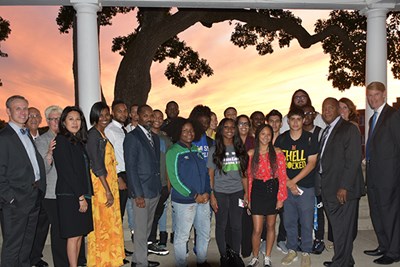Students Learn From Plays, Art, History and Literature
 Image by K. Webster
Image by K. Webster
01/02/2020
By Katharine Webster
First-year chemical engineering major Kevin Griskevich approached English classes with fear and loathing. He found them “dull, tedious, irrelevant and uninspiring.”
He was cautiously optimistic, though, after he read a description of the First-year Seminar in Honors (FYSH), which does double-duty as honors College Writing I or a humanities elective.
The course, Text in the City, plunges students directly into the history and culture of Lowell, a former mill city built on the dreams and labor of immigrants that boasts a vibrant arts scene today.
Griskevich said the course exceeded his hopes, providing him with a “direct and unmediated” learning experience that connected him in profound and unexpected ways to the city, its history and its buildings.
His favorite activity was a visit to the Boott Cotton Mill Museum at Lowell National Historic Park, where he learned about the role of the Lowell mills in perpetuating cotton plantation slavery in the South. Also high on his list: a tour of historic city buildings led by Anthony Sampas, a UML librarian and the nephew by marriage of Jack Kerouac, the famed Beat writer and Lowell native.
“Reading a novel about the structures we visited wouldn't suffice; I wouldn't have been able to develop the physical and emotional connection to the historical sites that have assisted me in understanding the significance of each structure,” Griskevich wrote in his final essay for the class.
 Image by K. Webster
Image by K. Webster
Two years ago, the Honors College revamped FYSH to make it part of the First-year Writing Program. Honors College Dean Jim Canning believes that reading, writing and public speaking skills are essential to students in every major. He’s also a strong advocate for student engagement in the community.
Even students who grew up near Lowell and went on school field trips to the national historic park are surprised to learn about the breadth of cultural experiences the city offers, from the Luna Theater at Mill No. 5 to the New England Quilt Museum. The honors students also gain a greater appreciation for Lowell’s architecture and network of canals.
“I see all these mills converted into apartment buildings, and I used to think they were ugly, but now I see why they wanted to redevelop them instead of tearing them down,” says Kseniya Vialichka, a geological science major from Shrewsbury.
Nearly all FYSH students attend a play at the Merrimack Repertory Theatre – the Honors College bought 625 tickets to “Cambodian Rock Band” this fall – and visit one or more exhibits at the national park.
Jared Hebert, an electrical engineering major, loved seeing the park's Suffolk Mill turbine exhibit, which demonstrates how engineers harnessed water power to run every machine in a four-story textile mill.
“Since I saw that wheel spinning, I thought, ‘This is something cool – that I could not only hear about what was happening, but physically see it,’” Hebert says.
 Image by K. Webster
Image by K. Webster
Those hands-on experiences, coupled with lessons in academic writing and research, are what make FYSH a course that stands out.
“It’s great to understand the place you’re going to be living for the next four years, and now I have a desire to know even more about the textile mills and the ingenuity that went into designing the machines,” says Sid Iyer, a senior plastics engineering major who says FYSH was his favorite first-year class.
Faculty have leeway to adapt the FYSH curriculum based on their particular expertise and interests. Depending on the instructor, students might attend a community festival, hear a lecture on Kerouac, tour the greenhouse that’s run by the urban farming nonprofit Mill City Grows or visit Western Avenue Studios, one of the largest artists’ communities on the East Coast.
Visiting Prof. Julian Zabalbeascoa, who leads the honors study abroad programs in Cuba and Spain, brings his FYSH classes to a Cambodian restaurant, Simply Khmer, to sample the food of Lowell’s largest immigrant group.
Anne Apigian, a first-year student advisor and former career counselor, introduces her FYSH students to career exploration tools and brings in guest speakers, including older honors students who are further along in figuring out how to get the most out of their time at UMass Lowell.
 Image by K. Webster
Image by K. Webster
Tess George, an adjunct faculty member who also teaches a popular honors seminar in critical reading and thinking, brings her FYSH students to the Center for Lowell History to do research with primary sources, including historic photos and engineering plans for the canals and mills.
Visiting Prof. Rachel Mansfield, who also helps students apply for national fellowships and scholarships, offers her FYSH students extra credit to design a research project and write it up as an application for a $1,200 Honors College Student Fellowship.
Greg Reimonn, a plastics engineering major, took advantage of that assignment to design an experiment on plastics pollution in rivers and streams. With Mansfield’s encouragement, he found a faculty member willing to advise him, submitted the application – and got the funding.
“It’s rare for a freshman to get an opportunity like this,” says Reimonn, now a sophomore. “The faculty here are very open to working with undergraduates.”




